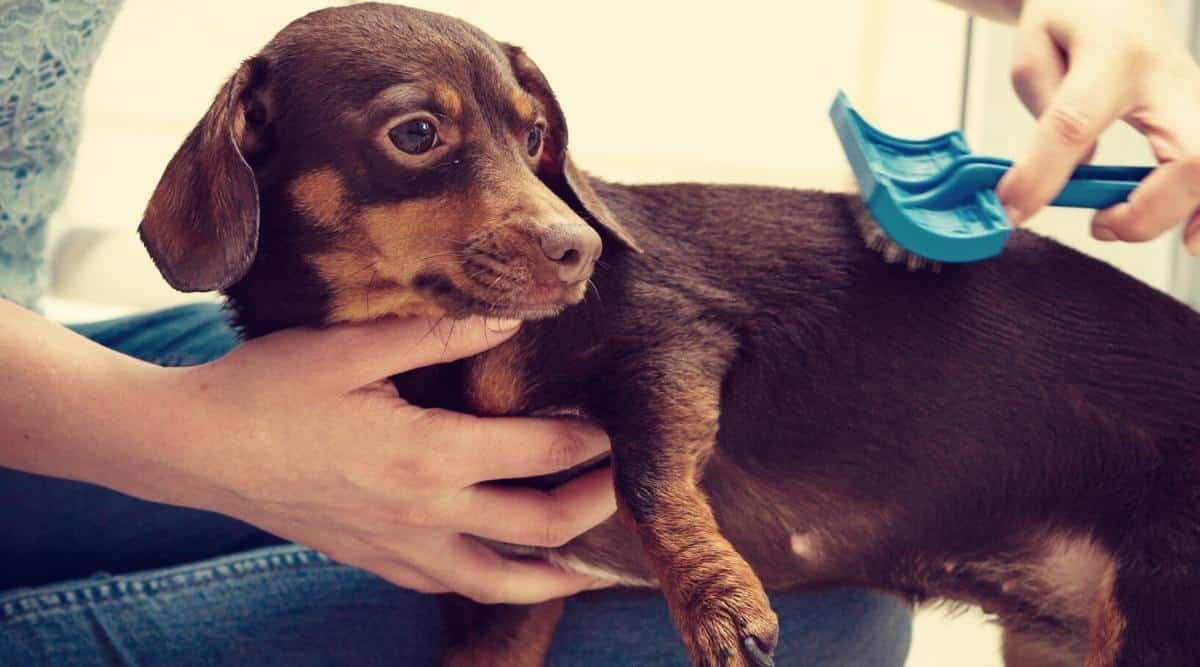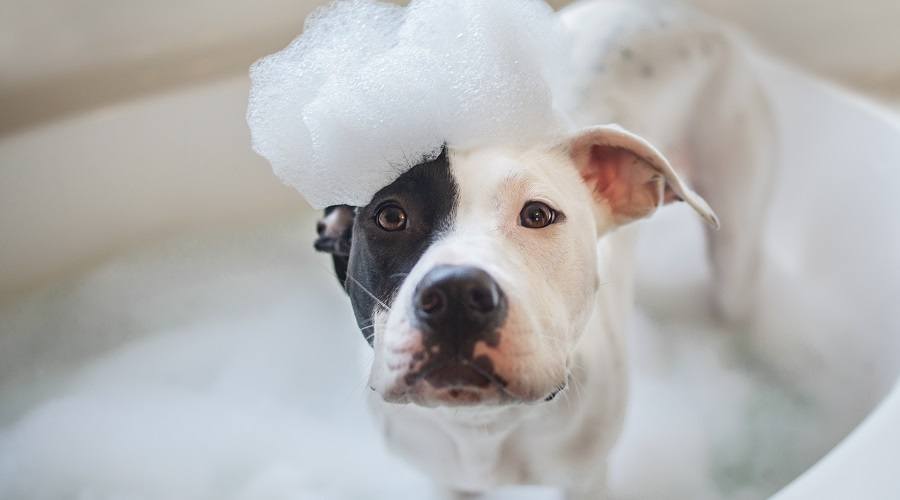Bichon Frise Shedding: How Much Does The Bichon Frise Shed?
When you purchase through links on our site, we may earn a commission. Here’s how it works.
Does the Bichon Frise shed? It might surprise you to know that they do shed, but very little! These pint-sized pups look like a cuddly little bear and are sought by many dog owners looking for a low shedding hypoallergenic dog. The Bichon Frise is a small but sturdy little pup. According to the American Kennel Club, he stands alongside some of the best ‘personality dogs’ in the world. His most distinctive feature is his brilliant and velvety coat that is heavenly to touch.
But, does it shed, and is it a nightmare to look after? Yes, he does shed, but he doesn’t shed a lot. He is a high maintenance dog when it comes to his grooming schedule. So, it’s essential to learn how best to manage his coat to keep him looking like the cutest bundle of mallow fluff that he is.
We’ll also run you through the best tools to keep him looking great and to make your life easier. As well as when hair loss is a sign that he needs a road trip to his least favorite friend, the vet. So, without any more deliberation, let us introduce you to the Bichon Frise and his glamorous coat.
Table of Contents
Bichon Frise Coat
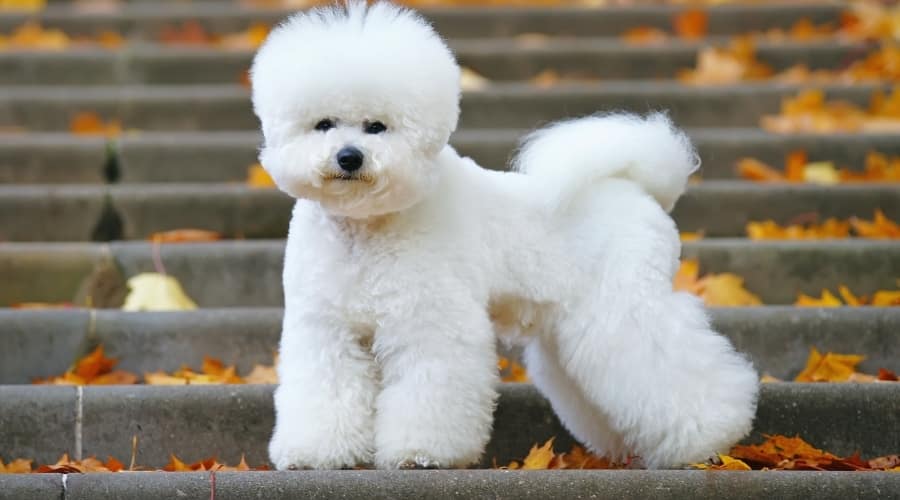
The Bichon Frise looks like he has walked into a cloud and decided not to shake it off. He is a hypoallergenic dog who is born with a single-layer coat. And when he reaches the age of one year or so, his top layer, also known as the guarding hairs, will begin to grow through. Because of this and his tight curls, his shedding schedule is different from most other canines.
The Bichon Frise sheds, but he sheds very lightly compared to other double-layered coat dogs. The hair that he loses will fall back into his cloud, which means you’ll hardly see any hair floating around your home. This is why he is a hypoallergenic dog. Unlike most hypoallergenic dogs who have a single coat layer, the Bichon Frise has a double-layered coat.
The two layers work together to keep him warm in the winter and cooler in the summer by falling out according to the season. So, he is a seasonal shedder, but as we say, when it falls out, it actually gets caught up in his coat.
So, instead of heavy shedding seasons and clumps of hair everywhere, you’ll only see a little bit of hair from time to time. And if there are humans in the family with white-colored hair, you’ll notice very little difference in it. His coat has tight curls that need extra attention when it comes to brushing him, which we will go through further on in this guide.
Bichon Frise Color
The canine cloud that is the Bichon Frise has one primary color, and that is white. Many Bichon Frises are entirely white, and some have apricot, buff, and cream accents. But whatever color he chooses to sport, you can be sure that they all shed the same. And they all require the same amount of grooming.
Bichon Frise Shedding Frequency
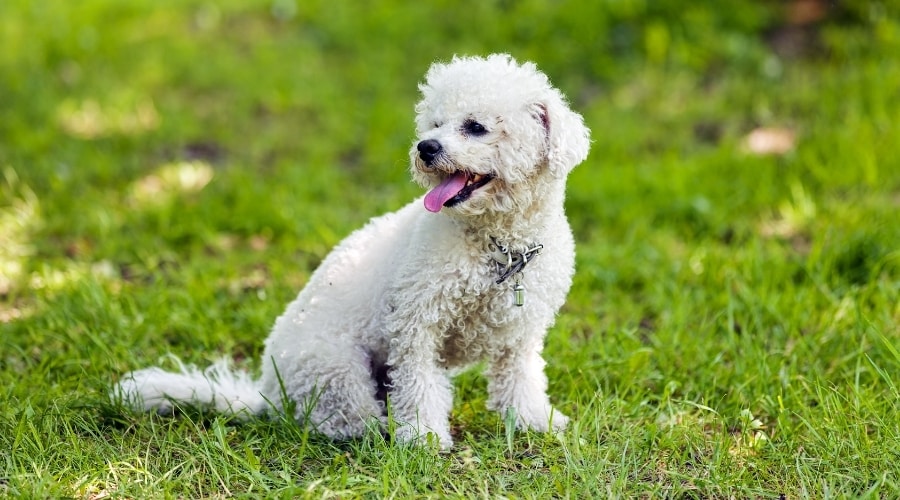
The Bichon Frise loses his hair lightly throughout the year and a little heavier during the shedding seasons. But nowhere near as much as other double-coated dogs. As he sheds, most of his old hair will fall back into the cloud, and you won’t see most of it until you brush or wash it out.
This means less hair on your floor or clothes and more in the brush and bin. And this is just one of the reasons why many of us, particularly us with dog allergies, choose the Bichon Frise as our little canine sidekicks.
Hypoallergenic Dogs
Because the Bichon Frise sheds lightly, he finds himself in the hypoallergenic dog group. But what does this mean, exactly? Well, hypoallergenic means that something is unlikely, or less likely, to cause an allergic reaction in sufferers. It’s important to note that this does not mean it will not cause a reaction. It’s just less likely to. The Bichon Frise is extremely popular because of this designation, as is the low shedding Goldendoodle.
So, hypoallergenic dogs are dogs who are more tolerable for those with allergies. This is because Bichon Frises have less dander, as he sheds much less. Dander is what sticks to the fur that dogs shed, and it is a collection of wooly fur, dead skin, coat oils, and dust. All of this, along with saliva and urine, is what causes reactions in sufferers.
Other Reasons For Hair Loss
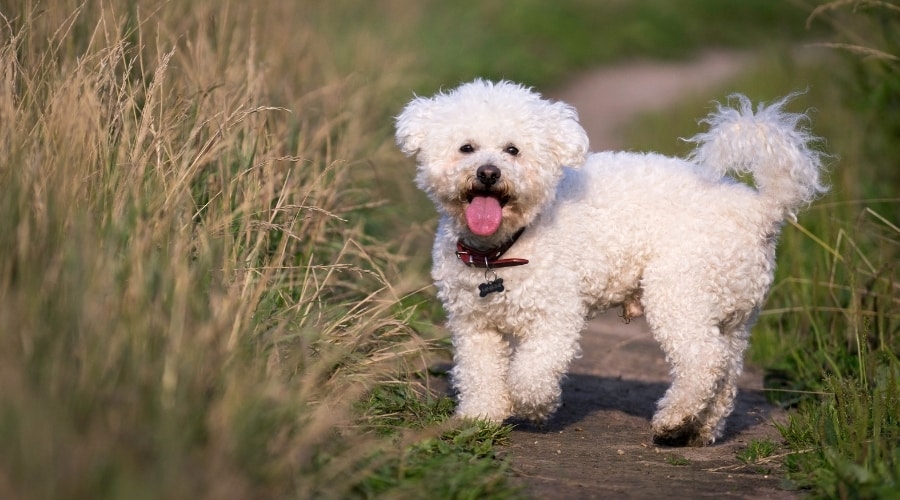
Thankfully, because Bichon Frises shed lightly throughout the year, it’s easier to notice when he is shedding more hair than he should be. And if you do notice this, it’s time for a trip to the vets. It’s important to know that all Bichon Frises are different, and some will lose more hair than others. So, it’s essential to understand what is normal for your Bichon Frise.
One of the most common reasons for excessive hair loss in dogs is stress, much like us. The Bichon Frise is a sensitive soul who will pick up on unhappy feelings in the home or a change in circumstances. Such as moving house or a relationship breakdown. When he is unhappy, his hair will fall out more frequently, but this should stop once things settle again.
Excessive hair loss could also be a sign of pregnancy. Horah for more clouds! When mothers’ hormones are raging, one of the first things to happen is hair loss. And this is the same in humans. As soon as she gives birth, her hormones and hair loss schedule should return to normal.
If you cannot pinpoint the reason for his hair loss, there is a chance that it is a symptom of an illness or infection, so you need to get him checked out. It could be a superficial skin infection or as a result of fleas and other parasites. But it could also be a sign of something more sinister. Inflamed skin, or hair loss in patches, is another sign that you need to get him to the vet.
Managing Your Bichon Frise’s Coat
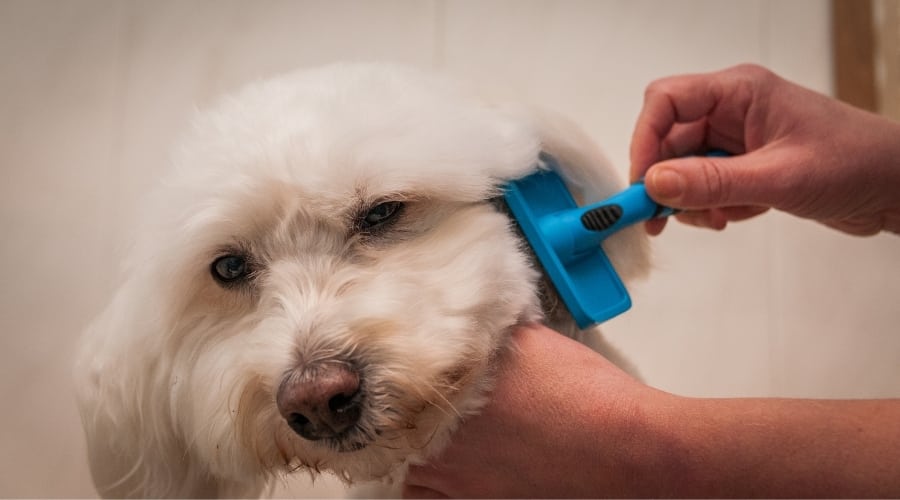
He might not shed anywhere near as much as other dogs, but don’t start the celebrations just yet. He needs just as much grooming as other dogs out there, and then some more. He is a high maintenance dog for sure. Here are the main ways to manage his cloud coat and keep him looking heavenly.
Brushing
Brushing is going to be your go-to way of managing his coat. As you already know, the hair that he loses will fall back into his coat, and so brushing is how you get it out. Brushing will stop his fur from tangling, and it will spread his natural coat oils around and keep him looking healthy too.
You will need to brush the Bichon Frise every single day. The hair that falls back into his coat, and his tight curls, are prone to tangling and matting. Without daily attention, tangles will quickly snowball into matting, and this can be very painful.
Brushes
Just like everything in life, if you want a job done, you need to do it properly. And that starts with the correct tools. Brush him with a pin brush, as this will help to remove the dirt and the dead hair. Once you have given him a thorough brushing, from head to paw, use a comb to run through his coat for a final touch up. This will keep his locks curly and bouncy, just as they should be.
Many Bichon Frise owners also like to trim their Bichon Frises once a month with a pair of scissors. They will shape his coat and contour it to the lines of his body. Giving him the perfected mallow shape that he is so famous for. For those that aren’t too fussed with the perfected look, this isn’t a necessary step.
Shampoo
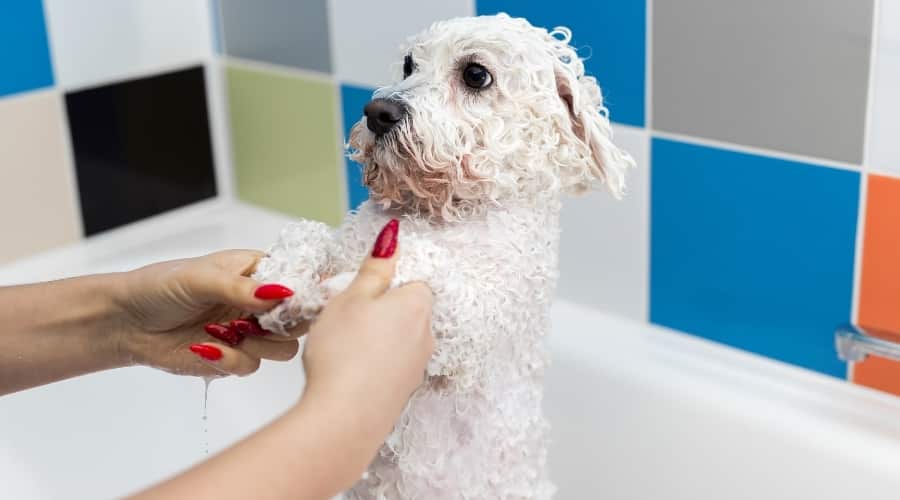
Getting the right shampoo is also another way to manage his shedding effectively. Because if you get one that doesn’t agree with his skin, he could shed even more. If he suffers from sensitive skin, you will need to get a gentle shampoo that will not irritate him. Oatmeal shampoos are a great option or those made with natural ingredients.
If he does not need a gentle formula, and you want to keep him snow-white, you could opt for a brightening shampoo. This is popular with show Bichon Frises. Alternatively, as he is a shedding dog, you could opt for an anti-shed shampoos, but this is usually reserved for heavy shedders such as the Golden Retriever.
Because of his tangle-prone fur and curls, we would also suggest a shampoo with a conditioning formula or ingredients. This will decrease the chances of his coat tangling, and it will give him a soft velvety sheen too. Bath him once a month, and be sure to dry him thoroughly to prevent him from developing any skin infections or encouraging mold spores in his coat.
Diet
Your Bichon Frise needs a top-quality diet to keep his coat healthy and as shed-free as possible. Many owners do not realize that what you put in his bowl will help him to look healthy and youthful. Look for a high-quality kibble that is well-balanced and provides plenty of omega fatty acids. Ingredients such as fish, fish oil, egg products, flaxseed, and oils will nourish his coat.
Vitamins and minerals, such as biotin, zinc, vitamin E, and folic acid, will also support healthy skin and coat. Unfortunately, budget store kibbles do not provide a balanced diet, and they will not encourage a beautiful jacket either.
Supplements
Supplements are an easy way to ensure that he gets enough omega fats into his diet, without the mess of oils and real fish. Fish oil supplements not only help to keep his skin and coat healthy, but it will also ensure that he only sheds when he needs to. They also have other health benefits, too, such as encouraging supple joints and improving organ function, as well as overall health.
Frequently Asked Questions
The Bichon Frise is a high maintenance dog when it comes to his grooming schedule. And often, many owners have a variety of questions about his shedding and how best to manage it. Here are the most frequently asked questions.
Does the Bichon Frise shed a lot?
Although he does shed, he doesn’t shed a lot. The minimal hair that he does shed usually falls back into his coat, meaning that you see less of it around the home. As he has a double coat, he’ll shed slightly more during the shedding seasons.
Do I need to take my Bichon Frise to the groomer?
You don’t have to take him to the groomer, but because he is such high maintenance, many Bichon Frise owners do. Many take him to the groomer once a month for a clip, bath, and blowdry, and do the rest themselves every day.
My Bichon Frise has tangles, how do I get rid of them?
The Bichon Frise has a thick double-coat with curls, and as such, he will always get tangles. And as long this doesn’t turn into matting, this is fine. Try to work out the knots with your fingers, or tease them out with your brush. Using a leave-in mist spray will not only help to tease them out, but they will also prevent further tangles.
When is it time to take my Bichon Frise to the vet?
If your Bichon Frise is shedding just as much as a Labrador, there is probably something wrong. Or, if he is shedding in patches, or he has sore, weepy, or inflamed skin, this is another sure sign that he needs medical help.
Final Thoughts
And that’s everything that you need to know about the Bichon Frise’s coat and how to manage his shedding best. Yes, he does shed, but not as much as other dogs. And the hair that he does shed falls back into his puffy coat, meaning much less on the floor and on your clothes.
By brushing him every day with the correct tools, using the right shampoo, and feeding him a good diet, you will keep his shedding to a minimum. Some owners choose to send their Bichon Frise to a groomer, but some choose to do it themselves. But either way, he is an everyday kind of dog.

